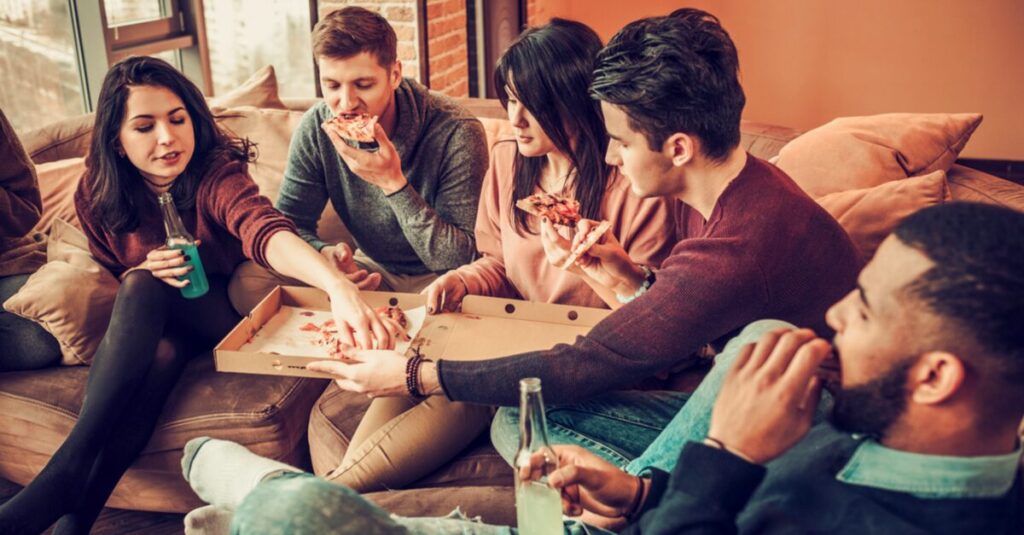
Socialising at university:
Freshers’ week
Starting university for the first time is daunting for everyone but can be especially so when you are starting with a disability or other conditions. The start of uni is quite a strange experience with everyone thrown in at the deep end.
- Try to attend events during Freshers’ week as this is the best way to meet people, people are always very friendly and looking to make friends
- Don’t be put off from attending events because you think you might not be able to participate, you might find yourself coping better than you thought or if possible try and contact the organisers to see how the event can be made more accessible

- Be unafraid to roam your Freshers’ fair, signing up for many societies and clubs – most people go to the fair just for the pizza, and you don’t have to commit to these new clubs. You can sign up just to find out more and decide later if you want to take part (all you’re committing to are many, many emails…)
- Your Freshers’ fair may have ‘accessible hours’ where the number of people will be reduced and quieter music. There may also be a queue jump pass available so you can save your energy for wandering around the stalls rather than standing in the queue
- You don’t need to attend every single event/night out in Freshers’ week, it’s good to have a bit of quiet time to recover
- Most people will be up for a quiet night in and it’s often these times where you get to know people best – many of our best moments at uni have just been sitting around in student halls chatting with a cup of tea
- You also want to save some energy for the rest of term rather than burning out in the first week!
- Get some sleep and food!
Telling people about your disability/condition:
If your condition is something that affects socialising it often helps to be open and honest from the start
- If people are aware of your condition they can make sure they are inclusive of you; often people are just unaware how different conditions might be excluded and once they know will be understanding
- Equally there’s no pressure to disclose if you don’t feel comfortable, there might be a later opportunity to drop it into a conversation, when you feel comfortable and you know your new friends a little better
A common misconception if that Freshers’ week is supposed to be the best week ever, but you’ll generally find that most people find Freshers’ week quite overwhelming and actually enjoy the rest of term more.
Going out
Uni isn’t all about going out but if this is something you enjoy then get your boogie on 🙂
- Planning is important
- Is the venue accessible? Clubs are often in basements or upstairs with questionable lift access
- Can you get a queue jump ticket? Save your energy for dancing rather than queuing out in the cold
- How will you get there/go home? Is it walking distance, can you get a taxi – does anyone else want to share one?
- Buddy up, it’s good to have someone that will check in with you in the club and go home with you if you find that you’ve had enough but don’t feel comfortable leaving alone
Finding friends
Find out if there’s a disability support group or community at your university
- Most have a facebook group for disabled students, often with smaller groups for more specific conditions so you can find people facing similar challenges to you
- Some universities run ‘family’ schemes which match you with older disabled students who can offer you advice and will be happy to listen and understand what you’re going through when other friends might not (despite great intentions!)
Societies are the best way to find people with similar interests to you or be brave and try something new or that you’ve always wanted to do. Whether it’s editing a newspaper, representing the university at sport or taking up a new one (quidditch anyone?), theatre, food-enthusiasts (hummus soc <3), knitting, debating, choir, religious & international student groups or volunteering, there are hundreds of societies to explore. And if a society doesn’t yet exist for your passion – simply start it!
Dis-organised fun
Yes, universities have hundreds of societies you can join, but NO, they’re not compulsory and you can have a great social life without them.
Alternatives include:
- Film-screenings & student theatre performances
- Talks: these don’t have to be academic or career-related, they also include debates on hot topics, pop-culture or societies inviting guest speakers – often open to anyone, you can turn up for a one-off talk & hear about something different
- Evening events: club nights, student union bops, pub-quizzes
- Evenings in: get together with friends and turn a baking session or netflix binge-watch into something social
University is about finding a balance between work and socialising. It’s better to have a couple of activities that you enjoy and have enough energy for rather than trying to do multiple different activities and burning out. Unfortunately you can’t do everything, but that’s also true for your able-bodied friends. Whether you’re determined to try new things, or continue something you already love, remember that everyone else is nervous too, so go along and strike up a conversation – you might just meet lifelong friends.
About Us
The general aim and objective of Head Up! is to promote the interests of young people with disabilities, physical and/or mental health conditions, specific learning difficulties and neurodivergence; offering them practical advice and support concerning their education and welfare.